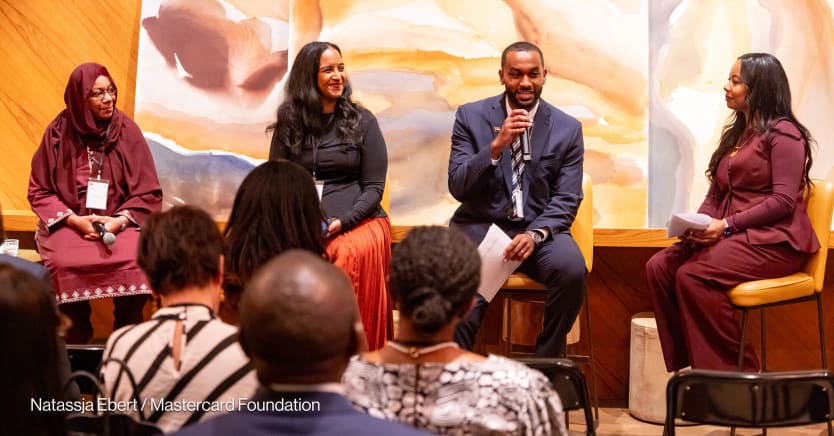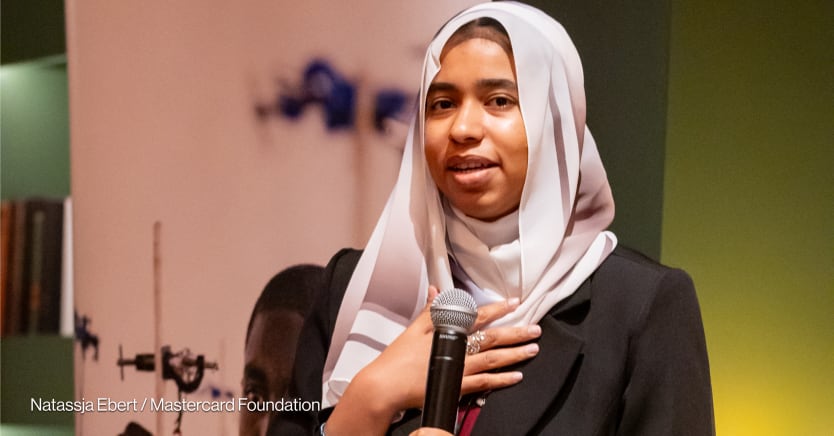
In war zones across the world, the same scene repeats itself. As the bombs fall, international development organizations pack up and leave, driven out by insecurity. Their exit creates a vacuum not only in lifesaving support, but in classrooms, in jobs, and in the fragile support systems that help people cope with trauma.
Take Sudan, one of the deadliest armed conflicts in the world. An estimated 150,000 people have died and over 12 million have been displaced since the war began in 2023. It has also unleashed famine, collapsed health systems, and gutted essential services.
With international development organizations constrained in their ability to act, Sudanese youth-led organizations inside the country and in the diaspora have stepped in to fill critical gaps.
From Cairo to Nairobi to Toronto, youth-led organizations such as the Sudanese Diaspora Network have mobilized the diaspora, raising funds, leveraging online banking platforms, and channeling resources to grassroots organizations.
Youth-led Emergency Response Rooms, or ERRs, have become a vital lifeline during the conflict, from fixing broken power lines to setting up safe escape routes for millions of people. To date, they’ve supported over four million civilians by cutting red tape and creating practical, innovative solutions on the ground.
Organizations such as Mutual Aid Sudan Coalition have supported ERRs to feed over 300,000 people through communal kitchens and provided food baskets to 180,000 more. Yet they receive less than 0.2% of direct humanitarian funding.
One of the greatest strengths of Sudan’s youth-led response is its connection to communities. By leveraging local networks and sourcing from local markets, young people are cutting through layers of bureaucracy and adapting quickly to changing needs, delivering critical support and modeling a community-driven approach to recovery and development.
This is one of the reasons why, on the sidelines of the 80th Session of the UN General Assembly in September, the Mastercard Foundation convened a session with Sudanese youth-led organizations.

The purpose of the session was straightforward: to explore how best to support young people and spotlight their innovation, courage, and leadership. The conversation asked two urgent questions: What does true partnership look like today? And how can support systems be reimagined to be rooted in trust and driven by local leadership?
The answers highlighted opportunities and solutions for sustaining education, creating livelihoods, and nurturing hope. The discussions even extended beyond Sudan, offering lessons for how support can be trust-based, locally driven, and globally relevant.
Panelist Maryam Garelnabi of Savannah Innovation Labs, an organization building entrepreneurship capacity among youth in Sudan, Kenya, and Egypt, put it plainly: “Global actors must learn to trust local organizations with flexible grants. Sharing resources rather than competing for them is our ethos.”
As she points out, local youth-led organizations are often sidelined by major development organizations. They are treated as mere helpers rather than codesigners of solutions. Their lived experience, their knowledge of how to reach relatives, neighbors, and classmates in need, often goes unleveraged.
Some observers argue that youth-led organizations lack the formal registration, compliance systems, and track records required for partnerships with global development actors. These are legitimate concerns about accountability. But these concerns cannot become excuses for exclusion.
Compliance matters. But the truth is, no one is closer to this crisis or more invested in solving it than Sudanese youth themselves. Their organizations are not just stopgaps; they are engines of innovation and solutions.
Working directly with young people is at the heart of the Mastercard Foundation’s Young Africa Works strategy, which is grounded in the belief that young people — especially women — are investable, capable, and ready to lead. This is why the Mastercard Foundation is committed to partnering with 1,000 youth-led organizations by 2030, recognizing the vital role they play in shaping and delivering inclusive, relevant, and impactful solutions.
The Mastercard Foundation has also partnered with the UN Refugee Agency in Sudan and in neighboring countries where Sudanese have been displaced. A key strength of this partnership is its support for more than 100 youth- and refugee-led organizations that are directly helping young Sudanese and host communities continue their education and pursue pathways to access dignified work. By backing local leadership, the partnership ensures that those closest to the challenges are also driving the solutions.
For the Mastercard Foundation, partnering with youth-led organizations encompasses more than programming or grant-making. Trust and cocreation are the cornerstones of our work with young people, and these values shape our partnerships. Our panelists challenged us all to go further and rethink how we engage with people in crisis.
Sudan’s war has become a test case for global development and its shortcomings. Top-down models designed in faraway cities cannot keep pace with the speed and complexity of crises like Sudan’s. But young Sudanese, with their networks and creativity, continue to succeed where larger systems have faltered.
We build trust not by arriving with ready-made answers, but by showing up, asking people what they need, and listening. Communities know their realities better than anyone else, because local leadership is ultimately what drives lasting change. When we support communities to exercise their agency and work alongside them as equals, trust and sustainable progress follow naturally.
The world has a choice. It can continue sidelining Sudan’s young leaders and risk compounding one of the most urgent crises of our time. Or it can embrace them as equal partners and cocreators of education systems, employment pathways, and resilient communities.
Search for articles
Most Read
- 1
- 2
- 3
- 4
- 5








